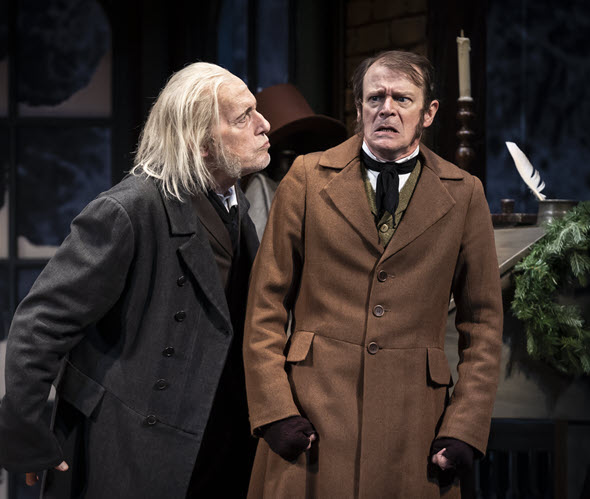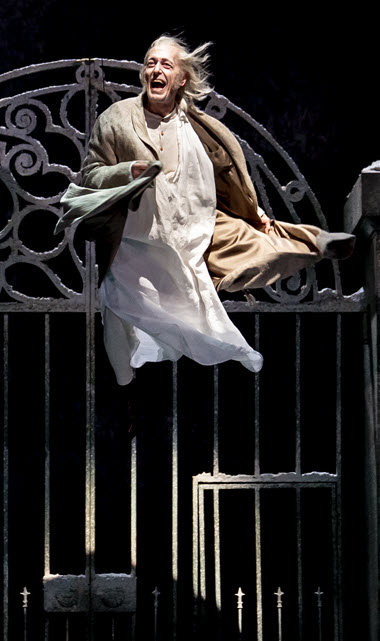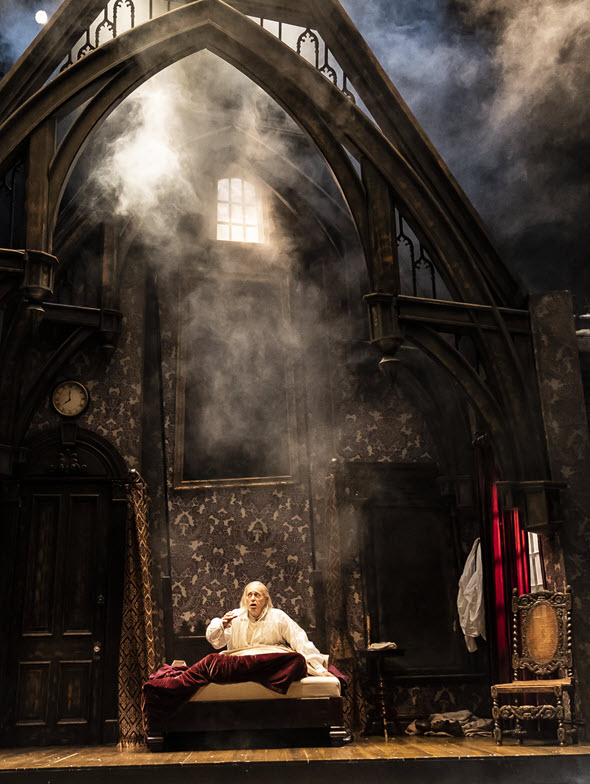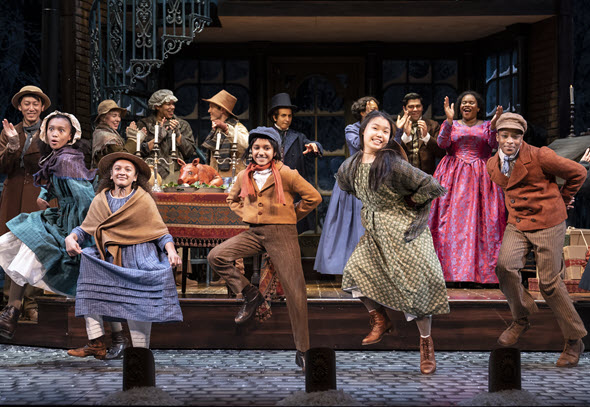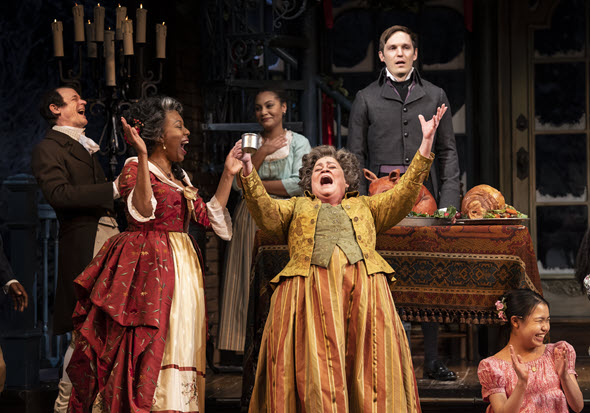‘A Christmas Carol’ at Goodman Theatre:
Taking heartless Scrooge to a reflective place
Review: “A Christmas Carol” by Charles Dickens, adapted by Tom Creamer. At Goodman Theatre through Dec. 31. ★★★★★
By Lawrence B. Johnson
As Chicagoland’s performing arts scene was stirring back to vitality this fall after its pandemic-induced hiatus, Chicago On the Aisle observed the 10th anniversary of our commentary on the city’s wealth of music and theater. That decade has been happily punctuated each year by the Yuletide renewal, the expected and indispensable ceremony, of Goodman Theatre’s “A Christmas Carol.”
After retreating into a streamed radio drama of Dickens’ story last year, Goodman has once again thrown open its doors to welcome Chicagoans back to the embrace of visible ghosts and the observable reclamation of an errant soul. And of the perennially good and touching accounts of “A Christmas Carol” I’ve seen on that stage, the present one may well be the best.
At the center of Goodman’s story-telling, as he has been for many a Christmastide, is Larry Yando as Ebenezer Scrooge, whose withered heart and depleted humanity are the objects of replenishment by the spirits of Christmases Past, Present and Future. So identified has Yando become with the role that one might surmise it has become stamped into unconsciousness, well-ingrained lines attended by conditioned flourishes of a sly actor. But what I saw in this renewal suggested quite the opposite. Yando is still very much engaged with the character, still probing into the vulnerable core of this rich but tight-fisted old man, an avowed misanthrope who long ago cut himself off from society and lost touch with the commonality of us all.
The trick of making Scrooge both amusing and compelling is to strike the right balance between lines and gestures that are overtly funny and those that carry real weight. Until the very end, Scrooge must be funny only to us – not to his beleaguered, underpaid clerk Bob Cratchit or to his solicitous niece Frida or to himself. He is not a man easily amused: He doesn’t have time for amusement; his business occupies him constantly. A psychiatrist might say his all-consuming pursuit of gain is his refuge from the pain and memory of his life’s course, indeed from himself.
While there are obvious incidents of wistful reflection for Scrooge as he and his ghost-guides revisit his past and look upon the present Christmas, in this production Yando and director Jessica Thebus find two telling moments that show us the old man’s potential for redemption – before the spirits ever enter the picture. These mere inflections of conscience might even suggest that Scrooge’s late-night time-travels are but the mystic revelation of a dream.
The first occurs after Scrooge has excoriated poor Cratchit (Thomas J. Cox in a sadly funny performance) for once again requesting Christmas Day off. The clerk, believing his appeal has been denied this year, is headed for the door when Scrooge bestirs himself from contemplation and grants the holiday. That’s as good as this crucial moment gets.
The second hint of Scrooge’s candidacy for reclamation comes as he approaches the dark old apartment building where he resides – its sole occupant. He sees a child singing a timeless song he knows from his own youth: He pauses, perhaps in the arrest of remembrance, then recovers himself and brusquely shoos the youngster away. This is authentic theater, serious and telling.
Goodman’s production manages exceptionally well to avoid stock characters and cliché mannerisms. In the opening scene at Scrooge’s money-lending office, when the bitter old sinner is annoyed, whether by the collectors of donations for the poor and by his niece Frida (Dee Dee Batteast, at once bursting with life and measured in her speech), Yando’s rising anger is genuine, deep and dangerous. So much the funnier, at the end, when, in self-parody, the chastened man literally growls at his clerk – before embracing him and raising his pay.
The spiritual journey that begins in Scrooge’s apartment offers an impressive reminder that, while “A Christmas Carol” may be Goodman’s cash cow for the year, the company lavishes a real treat on its enchanted and ever-returning audience. And with this pivotal scene, we get Yando in full schtick, as old Scrooge dons his night clothes and snuggles into bed beneath a massive comforter, the cares of the world dissolving into bliss. The entrance of Marley’s Ghost (the sternly cautionary Kareem Bandealy) is spectacular and the dialogue between the warning spirit and its incredulous beneficiary a rhetorical delight.
But the jewel among the spirits is the Ghost of Christmas Past, which appears in the luminous form of an actor cited in the program book as Lucky Stiff. (I suspect that is a stage name.) Who would not be susceptible to so beautiful an apparition as this creature of almost extraterrestrial aspect, speaking in a voice of resonant, articulate assurance? The Ghost of Christmas Present (vibrant and delightful Bethany Thomas) appears in a most unusual way, and unseen but daunting enough beneath layers of black is Christopher Sheard – on stilts – as the Ghost of Christmas Future.
Music plays a big part in this year’s production. A small onstage ensemble adds cheer to the proceedings as it frames the season and its celebratory atmosphere. In every respect, this splendid show bespeaks a tightly integrated creative effort, from Todd Rosenthal’s gorgeous sets and Heidi Sue McMath’s evocative costumes to the subtle enhancements of Keith Parham’s lighting and Richard Woodbury’s sound design.
In this of all times, it’s good to be reminded why Tiny Tim didn’t die, and to see why “A Christmas Carol” never will.
Related Link:
- Performance location, dates and times: Details at TheatreInChicago.com


